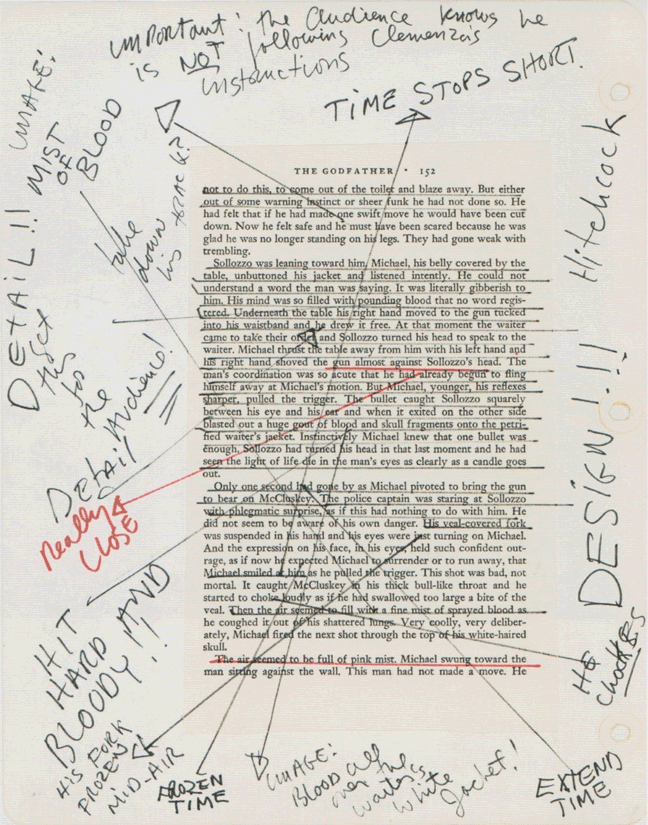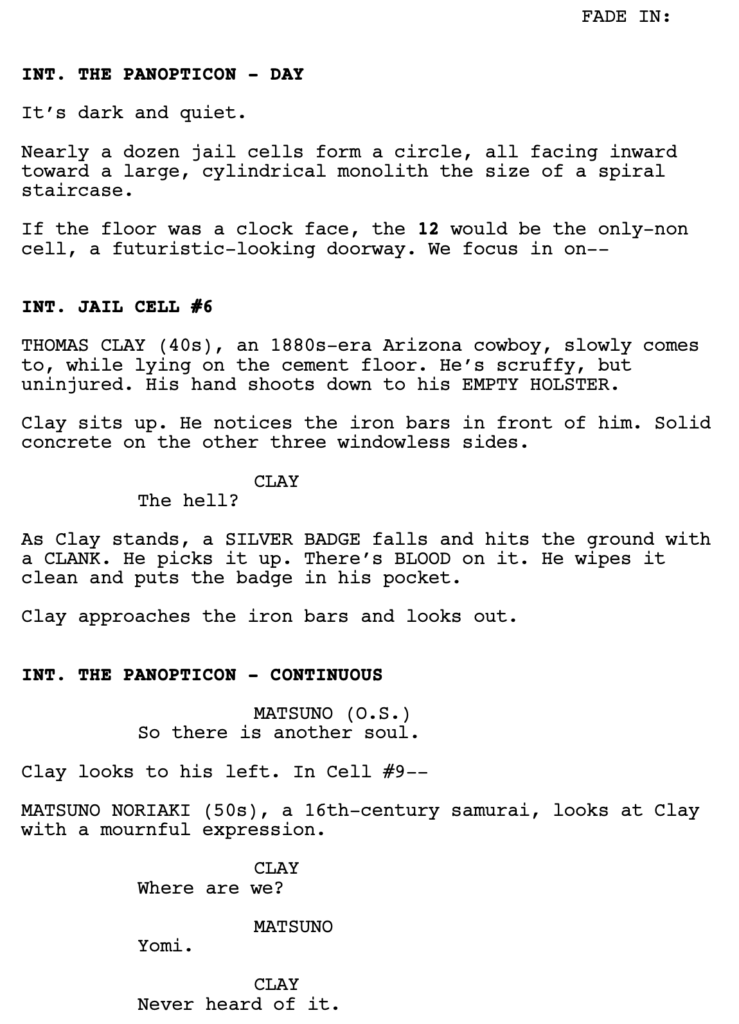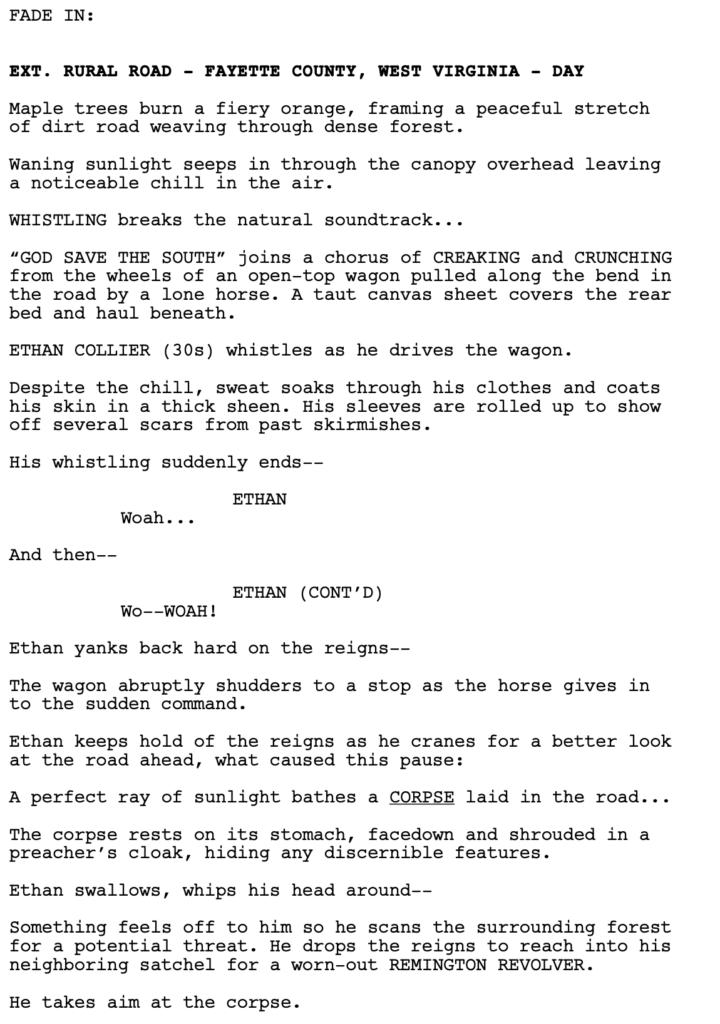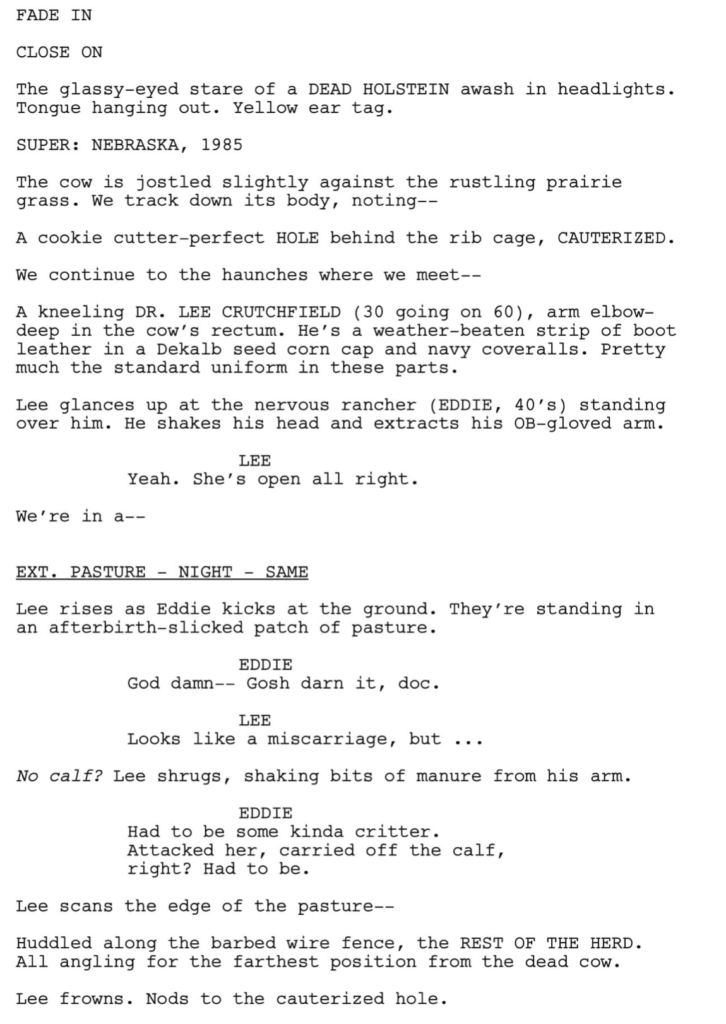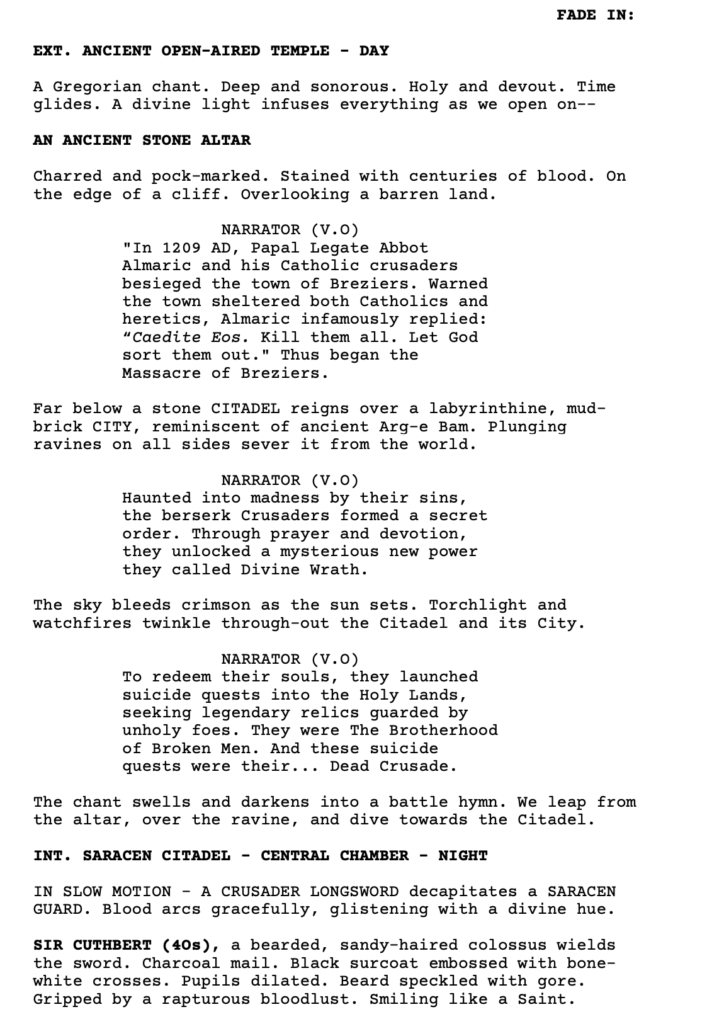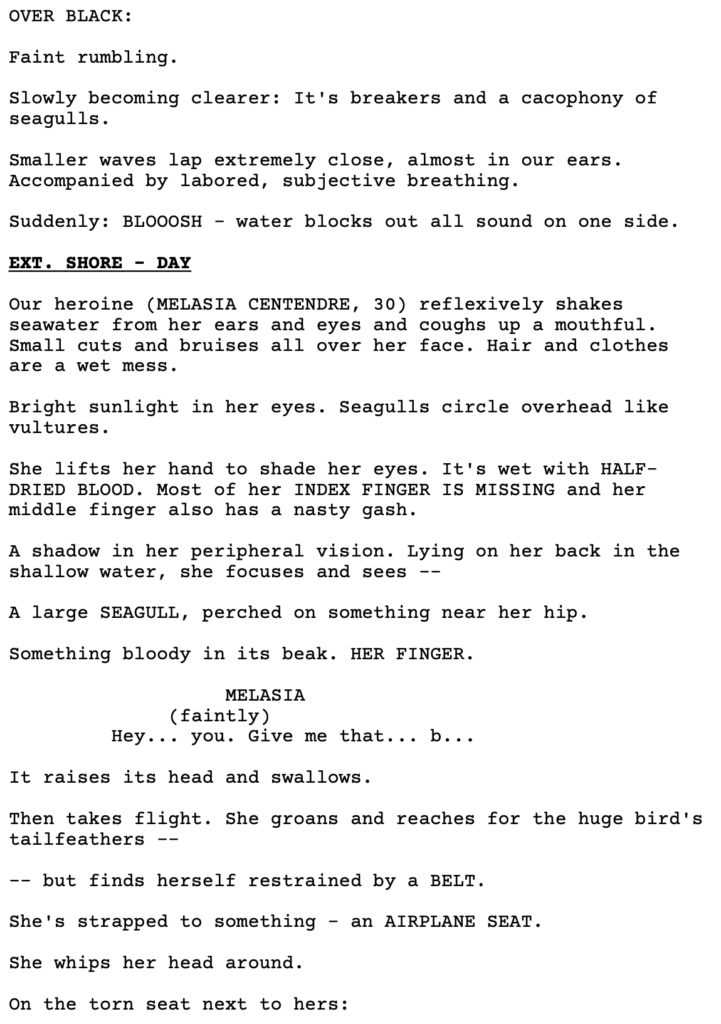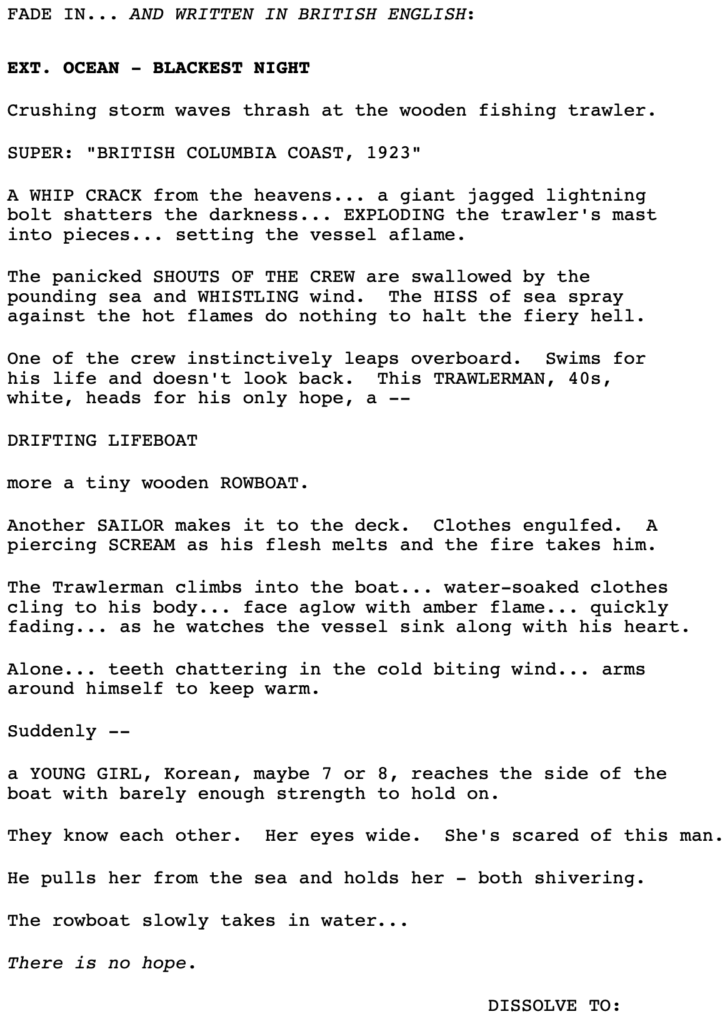Come on in and vote for your favorite first page!
I’m going to be a little shameless here but I feel like I have to be. 90% of the submitted entries for First Page Showdown were uninspired. To the point where I was getting upset. I will do a First Page Consultation — 1 page of notes — for $50, for anyone who wants one. E-mail me at carsonreeves1@gmail.com.
I want to help you guys put your best foot forward. I really do. But I can’t if you’re burying your head in the sand and hoping what you’re doing is working. I know for a fact that a lot of you are good writers. But you’re not showing that in your first pages and, I promise you, producers aren’t going to read on unless you address this. I can help you come up with something a lot better.
Okay, there have been some questions this month as to why I would hold a First Page Contest. It’s kind of random, right? But here’s how I look at it. There are a lot of writers who feel like they’re getting screwed by the logline process. They believe if readers would bypass the logline and just read their scripts, they’d realize how good they were! So this showdown is for them.
It’s been educational reading all the entries. I’ll probably get into more detail on what needed improving next week. But the two biggest mistakes were choosing scenes that didn’t have enough going on to make you want to turn the page and the scenes that did have something going on were executed too predictably.
Yesterday, I pointed out a moment in one of the professional scripts where a woman pulls her hair back revealing, “scar tissue like a necklace around her neck.” That single image made me want to turn the page. I remember thinking, “What’s that about?” when reading it. I wanted to know more. Which is one way to write a compelling first page. Drop a little mystery in it. It can be that simple.
Okay, let’s get to today’s entries. For those who don’t know, Showdowns are when you, the readers, read through each submission and vote for your favorite in the comments section. Whoever gets the most votes receives a script review next week. So, make sure you read all six first-pages before voting. I was originally just going to include the pages and that’s it. But then I realized, how would you identify what you were voting for? So I’ve included the title of each as well.
Voting ends Sunday night at 11:59pm Pacific Time. Good luck!!!
First up, “Battle for the Ages.”
Second up, we have, “Haul.”
Third, we have, “The Harvester.”
Fourth up, we have, “Dead Crusade.”
Fifth, we have, “Neobiota.”
And finally, in our sixth slot is, “Wicked Grin.”
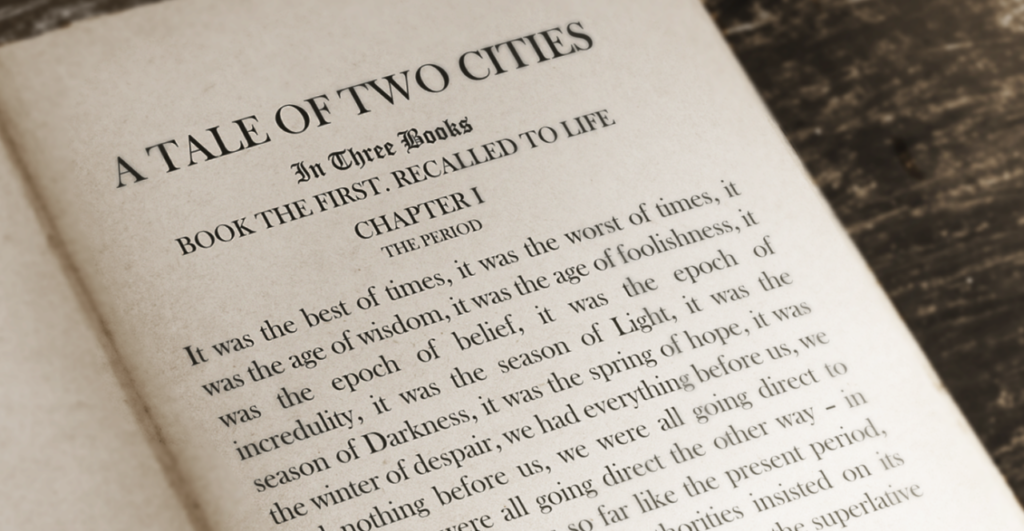
Today (Thursday) is the deadline for First Page Showdown. You submit the first page of your screenplay. I pick the five best first pages and post them tomorrow. The site votes on their favorite. Whoever wins gets a script review next Friday.
What: First Page Showdown
Send in: Title, Genre, Logline, and a PDF of the first page of your script
Deadline: Thursday, September 21st, 10:00pm Pacific Time
Where: e-mail all entries to carsonreeves3@gmail.com
Out of curiosity, I went back and looked at the opening page of the last five scripts I gave good reviews to ([xx] worth the read or higher). Here they are:
Black Kite – After a devastating wildfire wipes out a small California town, a teenage girl is missing and presumed dead. A year later, an obsessive mother and cynical arson investigator begin to suspect that she’s still alive…and in the clutches of a predator.
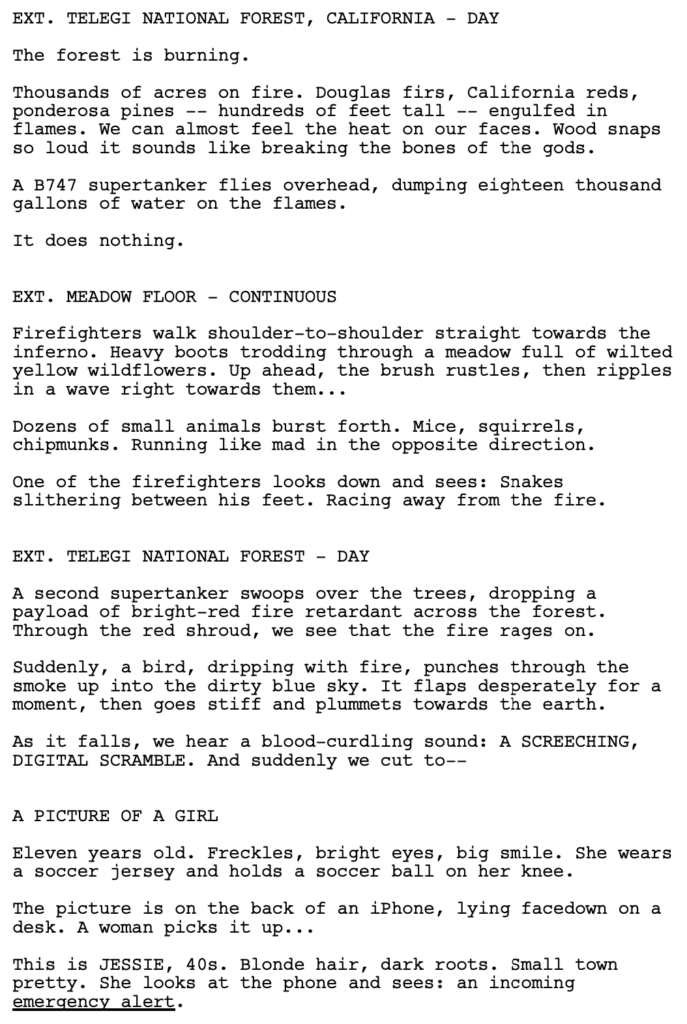
Wayward Son – When her estranged son returns and takes her grandson in the night, a veteran park ranger sets out to rescue him from the clutches of a mysterious cult deep in the Oregon woods.
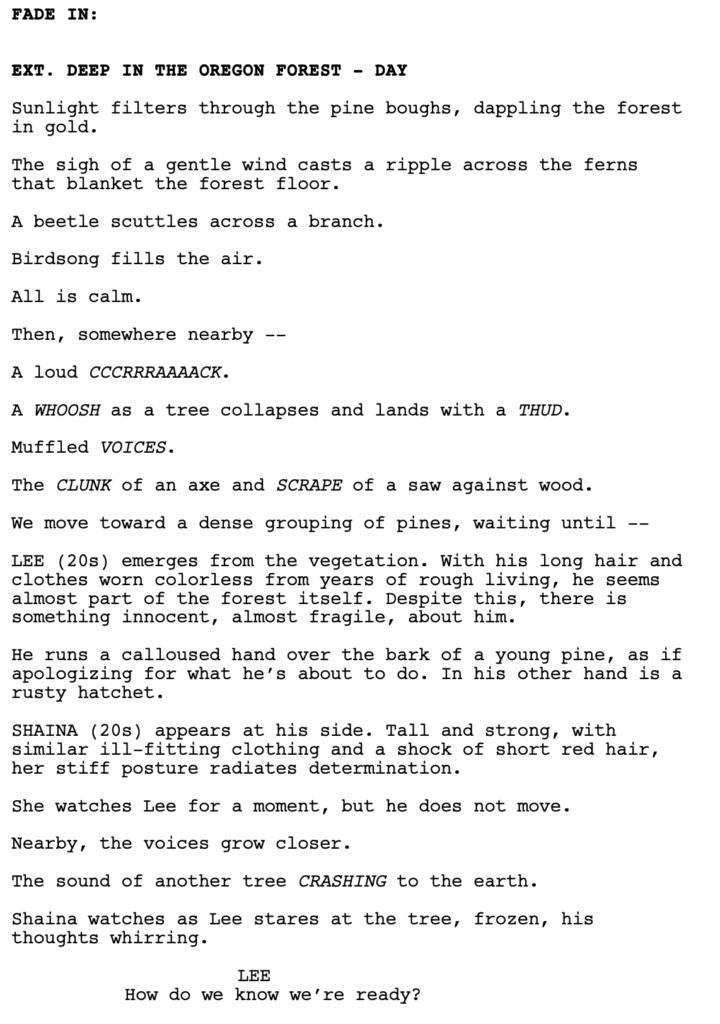
The Decameron – During the Black Plague, a group of rich Italians head off into the countryside to party out the plague in a beautiful villa.
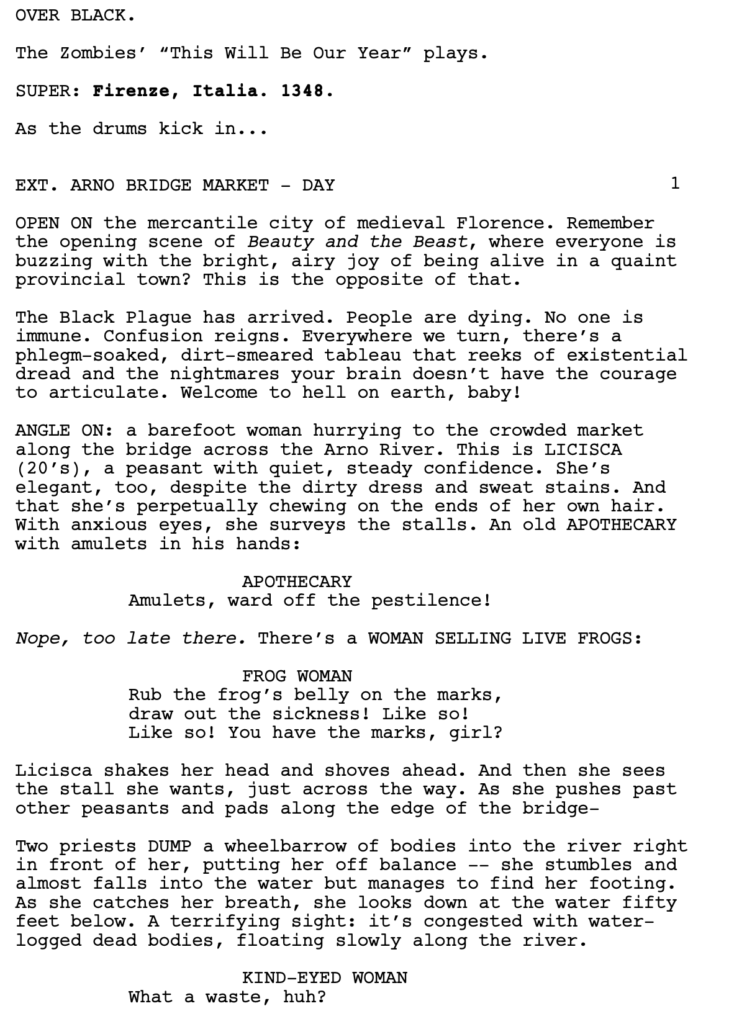
Wild – A werewolf living on a remote farm with her older sister takes in a thief on the run just 72 hours before the next full moon.
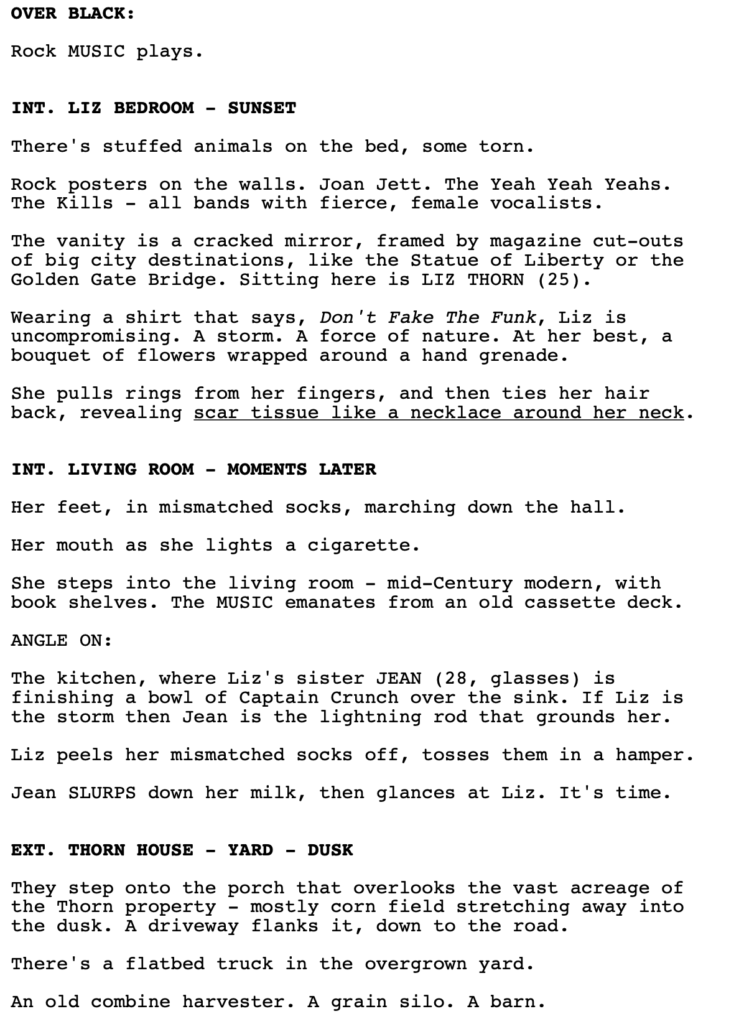
The Pack – A documentary crew in contention at the Emmys for their film about wild Alaskan wolves is hiding several big secrets about their troubled 3 month shoot.
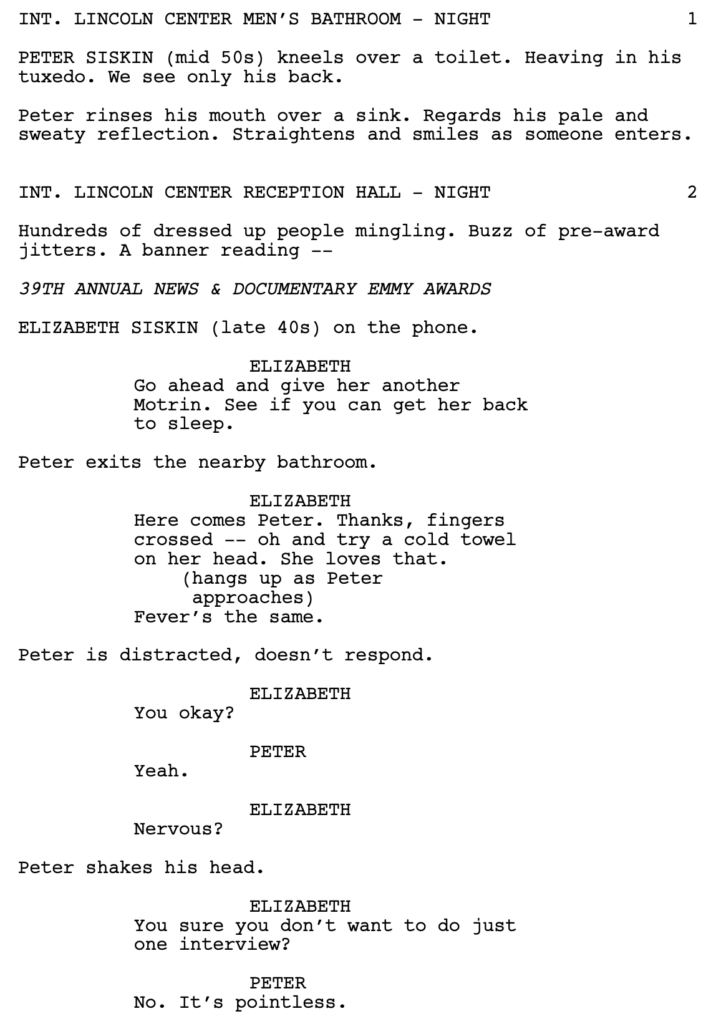
You’ll notice that not all of them start with a great first page. I’d say that both Decameron and Black Kite start strong. Wayward Son starts out all right. A little bit of mystery there. Wild throws in the “scar necklace” which makes me want to keep reading so that one was pretty good. And The Pack starts off fairly weak. This would seem to dispel the myth that a strong script is synonymous with a strong first page. Which would seem to indicate that our little showdown this month is irrelevant.
Ahhhh, but it so very much is relevant, my friends.
You see, a script read can be broken down into two categories. Those categories are, “Hafta Read” and “Give It A Shot.” “Hafta Read” is when the reader has to read the whole script whether he wants to or not. Every script I read for the site is a Hafta Read because I need to be able to discuss the story in the review!
However, nobody in the industry has a screenplay review site. For that reason, many of them read scripts from a “Give It a Shot” perspective. They’ll read the whole script if it’s good. But if something rubs them the wrong way early or they just don’t like what they’ve read, they’ll give up on it. And they’ll do it quickly.
Some of you might be confused about when this happens because, say, if a production company wants coverage on a script and gets their secretary to write that coverage then that secretary is in a “Hafta Read” scenario. There are many instances throughout the industry where someone has to read the whole script.
But a lot of scripts make it into peoples’ hands through favors. And unless the reader is close with the writer, those favors almost always exist as “Give it a Shot” reads. This just happened to me recently. I went to visit extended family and one of my family members who knew what I did had a friend who had written a screenplay and asked me if I could check it out for them.
So I did. But I did so under a “Give it a Shot” pretense. If it was good, I’d keep reading. If it wasn’t, I was out. Particularly because I had a ton of work to do at the time. It was clear to me right away that the writing wasn’t up to professional standards. So I didn’t make it past page 5. And I was being generous. I probably went 3 pages longer than I needed to.
Favors are so prevalent when it comes to reading something that most of the scenarios you’re going to be in are of the “Give it a Shot” variety. You’ll cold e-mail a manager who likes your logline and says he’ll check out your script – send it along. I guarantee you, you are not in “Hafta Read” territory with that manager. They’re giving you five pages tops.
That’s the thing with “Give it a Shot.” It means something different to every reader. For some it might mean giving the script 10 pages, others 5, and still others, 1. And the less close the reader is to the writer, the lower that number gets. If I get a script from a friend of a cousin of a friend, I have .0001 level of commitment to that person. So when I open that script, I’m ready to bail if you don’t hook me by THE FIRST PARAGRAPH.
I bring all this up to remind everyone reading this post that it’s highly likely that any industry person you can get your script to is a “Give it a Shot” situation. And because of that, writing a great first page matters. Cause the reality is that these people will be putting outsized importance on your first page and using it to determine whether they like you as a writer and if they want to keep reading.
Even if you have a few people in your rolodex who will give you “Hafta” reads, what happens if they like your script and decide to pass it up to the more important people, the ones with the power to greenlight, the ones with the money? All of a sudden you’re right back in “Give it a Shot” territory, and what are you going to do? Tell your contact to hold off while you write a new first scene? Why not write a good first page already so you can win over both of them?
Okay, Carson. But some of those scripts you gave good reviews to were able to overcome average first pages. So how did they find success? Look, there is a “luck” component to all this. Sometimes you give your script to the right person at the right time and they’re looking for something exactly like that so they’re giving your script a lot more leeway than on a normal read. And if you get somebody with power who likes your script, your script all of a sudden has buzz and becomes a “Hafta Read.”
Even if I wasn’t reviewing scripts for the site, I would still consider the top 5 Black List scripts “Hafta Reads” because they’ve been vetted and that gives me enough confidence to read through any trouble spots the scripts might have.
But most of you aren’t there yet. I wouldn’t even consider low-tier professionals in Hafta Read territory.
You know, the bar for opening pages used to be a lot lower. Even back in the 90s, when the competition was fierce, most readers just wanted to see that the first page was well-written. That the writer could construct proper sentences, the prose was easy to read, and the eyes moved down the page quickly.
But these days, with our mega-ADD addled brains, that’s no longer enough. You need to have that AND you need to have something compelling going on, something that pulls the reader in right away. It’s a lot to ask of one page but if you were hoping for a quiet relaxed career in the writing world, go be a librarian. This is professional screenwriting. It’s where the big boys play. The bar is high.
It’s going to be interesting to see what pages make the cut for tomorrow’s Showdown. Maybe I surprise myself and include a page where nothing is happening but the writing is outright stellar. I just don’t know. But I’ll tell you this. I’m excited to find out. And I’m even more excited to see how good the winning script is.
The First Page Showdown deadline is this Thursday at 10pm! Here’s how to enter!
Genre: Comedy
Premise: A 13 year-old boy blackmails his favorite pop star into being his best friend.
About: This script received 8 votes on last year’s Black List. Writer James Morosini got some nice buzz a few years back for his indie film, I Love My Dad, about a dad who catfishes his son on a dating app in the hopes of getting to know him better.
Writer: James Morosini
Details: 94 pages
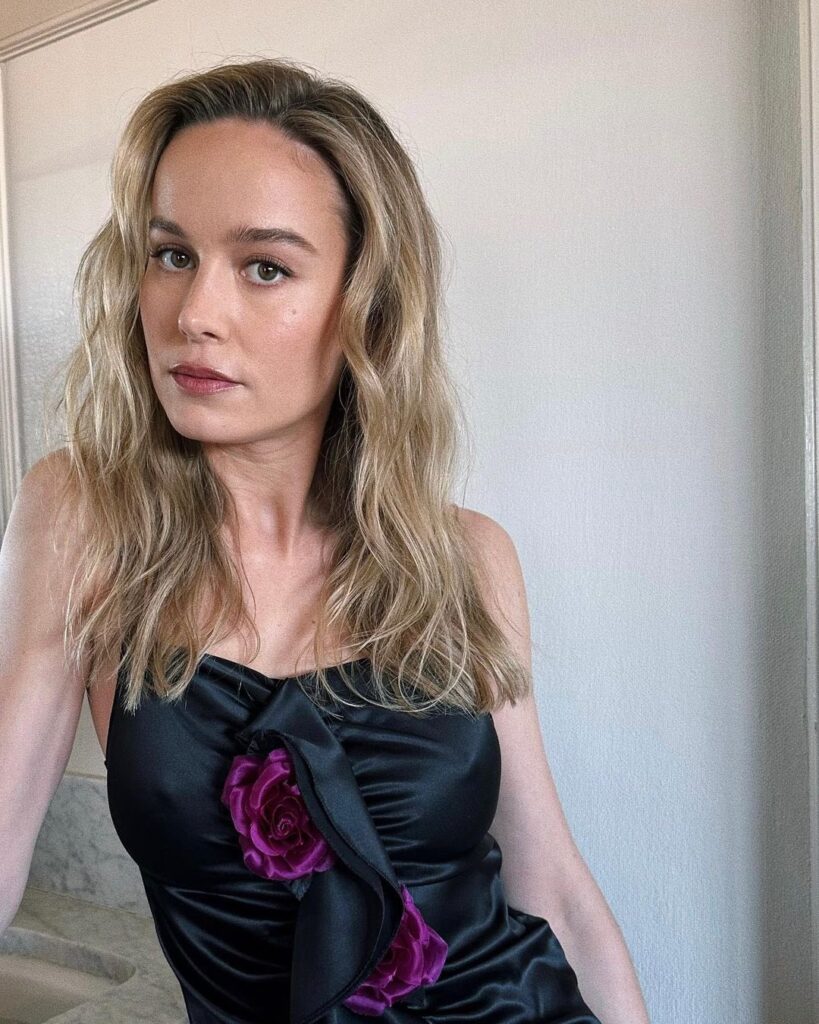 Brie Larson was already a pop star in a former life. So she should have no problem playing one.
Brie Larson was already a pop star in a former life. So she should have no problem playing one.
I know people are saying the Black List is dead.
I think one of you quoted a Hollywood agent who said, “If it’s on the Black List, I know it’s bad.”
Believe me, I’m not supporting the last four years of this list. I know the quality has gone down.
But let me ask you a question. If the Black List is irrelevant, how does Hollywood find writers anymore? There aren’t spec sales anymore. So if there are no specs and no Black List, how do writers get discovered?
There are only two avenues left. Writer-directors (direct your own scripts, bypassing the pipeline). And television writing. Get on a writing staff, make a name for yourself, then write a feature script that your agent sends out and hope someone likes it.
I’m not sure I buy the Black List is dead hype entirely. There are still ten legitimately good scripts to come out of the list a year. It just sucks that you have to wade through 70 other writtenly-challenged ones to find them.
Let’s find out if today’s script is one of the 10… or one of the 70.
Benny is a chubby 13 year old gay super-fan of Alice Foxx, who I’m guessing is inspired by Ariana Grande. That’s because Alice is a straight up b*tch. She spends the majority of her time complaining to her sister/manager, Nicole, about the mistakes that are made during her concerts (“The sync was off!”).
But Alice is not the nastiest character in the story. That title goes to Rick Ferraro, an aggressive paparazzo who feels like his early pictures of Alice made her a star and is bitter that she no longer gives him the time of day.
After her latest LA concert, Alice heads to the In and Out on Sunset (a woman after my heart) and dials up a double-double in the drive-thru. It just so happens Benny, who also needed to get his In and Out on, spots her, and chases her a few streets down where she parks on a side street to eat her In and Out in privacy (there’s nowhere around that In and Out to park but I’ll allow it).
While slinging delicious farm-fresh fried potatoes at her tonsils, the evil Rick Ferraro pops up and starts taking pictures of her. Alice tries to get away but accidentally hits him. She stops, apologizes, but he gleefully screams that he’s going to sue her. Enraged, she slams on the gas a second time, and with this one, she knocks him down hard enough to kill him! Just as this happens, Benny pulls up. Alice and Benny share a look and then Alice speeds off.
Benny reminds Alice about their mutual secret at Alice’s next fan meet-and-greet so Alice takes Benny backstage and asks him what he wants. Benny simply says, “I want to be your friend.” Alice figures she can give Benny the best day of his life then send him on his way and the problem will be solved. But after the day to end all days, Benny only wants to spend more time with Alice. In fact, he wants to spend the rest of his life with her.
Back in the 80s, Bill Murray came to Ron Howard with a project he wanted Howard to direct. Howard read the script, met with Murray, and told him he couldn’t see himself directing the project. “Why not?” Murray asked. “Well, there’s no one to root for in this story.” Howard said. This single answer enraged Murray so much that he blacklisted Ron Howard and never talked to him again.
Murray, a great performer, may not have been educated on the world of screenwriting at the time. But it’s a legitimate concern. You need the audience to root for at least one of your main characters.
You’d think we’d root for Benny here. He’s awkward. He has no friends. He’s sweet.
But Benny isn’t a real person. He’s so naive as to be oblivious to reality. He doesn’t live in a real life universe. His parents are dead and his grandma is, conveniently, asleep all the time, allowing this 13 year old kid to disappear for days at a time. His only language is weird dancing and regurgitating pop song lyrics. Benny is a caricature. He’s not a character.
That leaves us with Alice. Alice is a more complex character but she’s one of the most unlikable people ever. She’s selfish (she skips a Make-A-Wish meeting because the experience would be annoying). She doesn’t appreciate what she has. She’s always complaining. She’s annoyed by Benny and is always looking for ways to ditch him. So, of course we’re not rooting for her.
So who’s left? Nobody. And I’m sorry Bill Murray but, if there’s no one to root for, it’s hard to become engaged in a script.
But maybe they cast someone as Benny who’s so charming that we do root for him. It’s happened before. Well, even if you can get on board with Benny, this script still has major tonal issues. I talk about tone a lot on the site and I rarely go into detail about what ‘tonal issues’ means. So let’s give it a shot.
It boils down to a script that vacillates recklessly between two opposing extremes. For example, Benny is threatening to put Alice in prison for the rest of her life if she isn’t his friend. Seconds later, he’s bumbling around like a drunk weirdo doing a meme-worthy dance. I’m not convinced you can have it both ways. Is this a serious movie about a stalker or is it a straight-up comedy? The script keeps bouncing back and forth between the answer to that question.
With this type of story – and I’ve read dozens of scripts that have had this setup – they work best when the main character is competent and calculated. You need a character who we believe is able to execute a blackmailing plan in order to buy in. I suppose you could argue there’s something scarier about an idiot blackmailing you. Because they don’t use logic. But Benny is so pure that I never once believed he would give Alice up.
On top of all that, the screenplay feels rushed. The writer never commits to any details to make me believe this is a real pop star. If you’re covering a specific subject matter in your script, you have to give us AT LEAST ONE THING about that subject matter that we don’t know. In one of my favorite movies of the year, Blackberry, we get this early scene in the boardroom that goes into highly specific territory about how the Blackberry works. That helps sell us on the world, which, in turn, pulls us in.
If anything, I got the opposite impression from “Pop.” Alice sells CDs at her concert! Because we all know those Gen Z 15 and 16 year olds love CDs. It’s just as important to them as improving their laserdisc collection.
If there’s a caveat to this analysis, it would be that Morosini is a writer-director. Writer-directors are more adept at attacking potential tonal issues than when you separate the writer and director. I saw this in Birdman’s script-to-screen. I saw it in Three Billboard Outside Ebbing, Missouri’s script-to-screen. However, you got a lot of convincing you need to do to get me to believe “Pop” is in the same category as those films. Benny’s goofiness undermines everything the script is trying to do, which is pose a threat to Alice.
[ ] What the hell did I just read?
[x] wasn’t for me
[ ] worth the read
[ ] impressive
[ ] genius
What I learned: The official definition of a caricature is a distorted representation of a person in a way that exaggerates some characteristics and oversimplifies others. Which explains the character of Benny to a “T” (exaggerates: speaks mainly through his wild dances. Oversimplifies: Literally the only thing he cares about in life is being friends with a pop star). Caricatures can work with secondary characters in comedy scripts. But I’m not sure I’ve ever seen one work in the lead role.
Today’s article taught me a tremendous lesson about creating memorable main characters.
Genre: Article – Drama/Crime
Premise: Covers the unique job of Gary Johnson, a Houston cop who specializes in going undercover as a hit man to entrap murders-for-hire.
About: This article, which was written all the way back in 2001, was snatched up by indie super-director, Richard Linklater, who cast Glen Powell hot off the success of Top Gun: Maverick. He went and made the movie, which just premiered at Toronto Film Festival, and sold to Netflix for 20 million bucks, the biggest acquisition deal of the year. Linklater read the article all the way back in 2001 but couldn’t find an angle for it. It wasn’t until longtime collaborator Glen Powell came along (the two have worked together on three projects) that a movie emerged, as Powell zoomed in on the final three paragraphs of the article, which focused on a female client who wants to kill her boyfriend.
Writer: Skip Hollandsworth – article; Glen Powell and Richard Linklater – script
Details: about 4000 words
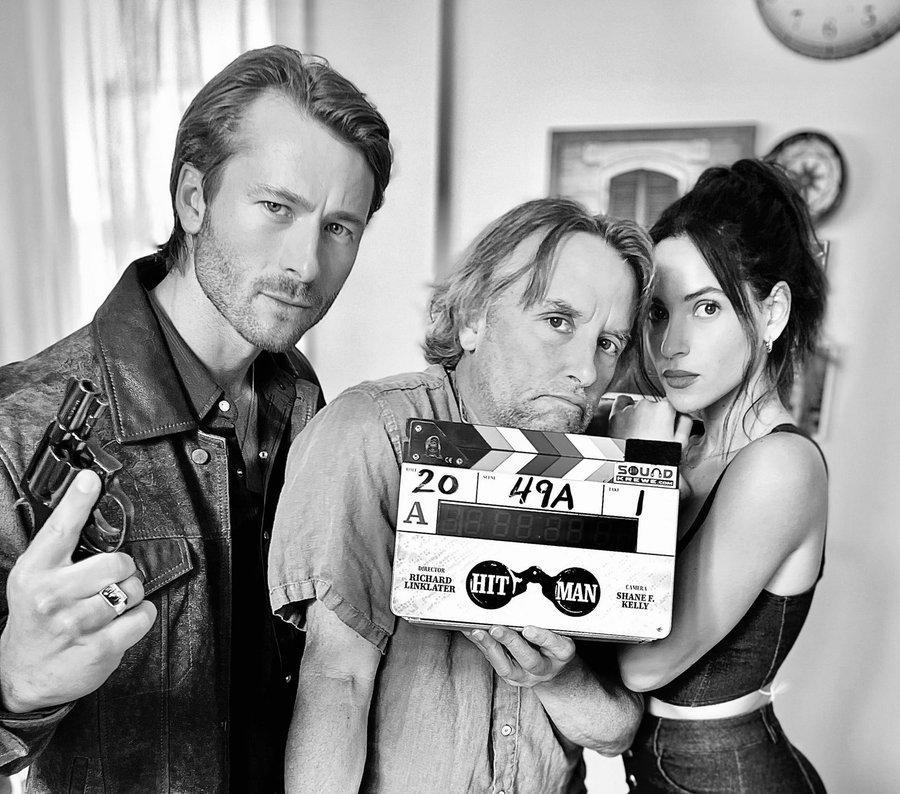
I’ve said it once. I’ll say it again a million times.
One of your primary jobs as a screenwriter is to look for stories that have a familiar element, then spin that element in a slightly different direction.
I’m not using the word “slightly” frivolously. That’s an important part of the equation. If you attempt to spin the familiar element too aggressively, it becomes unfamiliar, and audiences can’t connect with it.
Get Out spun a familiar setup – “Guess Who’s Coming To Dinner” – into a horror movie. Easy to understand. Beau is Afraid is a horror movie told through the lens of extreme anxiety. Nobody understood it.
Then you have the opposite mistake, where there’s no spin at all. That’s when you get movies like Blue Beetle. The exact same superhero origin story we’ve seen a million times already and, by the way, it involves a power suit that, literally, every superhero wears now.
We’ve seen a million versions of hit men. So it was a smart idea to flip that and say, “What if the hit man wasn’t really a hit man? What if he was a cop pretending to be a hit man in order to capture bad people trying to murder others?”
That’s a great starting point for a movie.
The article, appropriately titled, “Hit Man,” isn’t so much a story as it is a summary of the unique life of Gary Johnson. Johnson wanted to work in psychology but when he moved to Houston, he didn’t get his dream job. So he took some psych-adjacent work at a local Houston police office and stumbled backwards into his first murder-for-hire plot. A woman wanted to off her husband because he had taken to complaining too much about her spending. When a friend alerted the police, they threw Johnson into the fake hit man job simply because they had no one else.
Johnson went in with preconceived notions that he was going to have to put on some elaborate fake persona but the reality was the woman just wanted someone to hear what she was going through. Johnson listened, he secured the money for the hit, and the wife was immediately arrested.
Word spread that Johnson had an effective unassuming way about him that got people to open up, a crucial component to convicting these criminals, since you needed them to say, “I want to kill my spouse” for the arrest to hold up in court. So began a strange illustrious career of Johnson going on three hundred murder-for-hire calls in the span of 20 years.
The only call that went sideways was when a woman wanted her abusive boyfriend killed and when Johnson looked into her claim, he learned that the guy was, indeed, abusive. So he decided to help her instead of incriminating her. Which is the kernel of the story that seems to have inspired the movie.
I went into this article expecting to talk about concept. But the biggest thing that came out of it for me was the second paragraph. Here it is…
The man lives alone with his two cats. Every morning, he pads barefoot into the kitchen to feed his cats, then he steps out the back door to feed the goldfish that live in a small pond. He takes a few minutes to tend to his garden, which is filled with caladiums and lilies, gardenias and wisteria, a Japanese plum tree, and rare green roses. Sometimes the man sits silently on a little bench by the goldfish pond, next to a small sculpture of a Balinese dancer. He breathes in and out, calming his mind. Or he goes back inside his house, where he sits in his recliner in the living room and reads. He reads Shakespeare, psychiatrist Carl Jung, and Gandhi. He even keeps a book of Gandhi’s quotations on his coffee table. One of his favorites is “Non-violence is the greatest force at the disposal of mankind. It is mightier than the mightiest weapon of destruction devised by the ingenuity of man.”
The reason this paragraph spoke to me is because, in the last four screenplays I read, I didn’t have any feel at all for the main character. I knew, generally, who they were. But I didn’t *know* know. It’s hard to write a good story if the reader doesn’t have an innate feel for who your hero is.
The primary reason this happens in a screenplay is the writer’s reluctance to add detail. Threre’s a distinct lack of detail in the character’s appearance (an athletic frame tells a completely different story about a person than an obese frame). But, more specifically, there’s a lack of detail in their everyday life. As I read this second paragraph, I was overwhelmed by how quickly I knew this person. The fact that he has two animals he takes care of. The fact that he has this small pond with goldfish that he feeds every morning. That he tends to his garden. The fact that he meditates. Then he reads.
This morning routine tells us SO MUCH ABOUT Johnson. Just the fact that he has a morning routine and doesn’t wing it, tells us that he’s responsible. That he takes care of multiple animals tells us he’s loving. Meditation tells us he values giving time to himself. Reading Carl Jung and Gandhi tells us that he’s an intelligent man.
I probably know this character better in 10 lines than I do any character I’ve seen in the last 20 movies, despite spending two hours with each of them.
The next thing that caught my eye was this paragraph describing Johnson:
In law enforcement circles, he is considered to be one of the greatest actors of his generation, so talented that he can perform on any stage and with any kind of script. If he is meeting a client who lives in one of Houston’s more exclusive neighborhoods, he can put on the polished demeanor of a sleek, skilled assassin who will not sniff at a job for less than six figures. If he is meeting a client who lives in a working-class neighborhood, he can come across like a wily country boy, willing to whack anyone at any time for whatever money he can get.
In other words… ACTOR BAIT! This is one of things you should be looking for when reading an article or a short story that you’re considering turning into a screenplay. You’re looking for the kind of roles that actors would die to play. You should naturally extrapolate that out to the screenplays you write as well. Roles like this allow your main character to become different people which is the ultimate actor catnip.
I find it interesting that Linklater was unable to see the movie angle here. Because it’s pretty obvious. Here’s the last part of the article…
But not long ago Johnson did something out of character for him. He got a call about a young woman who had been spending mornings at a Starbucks in Houston’s Montrose area, talking to an employee there about the cruel way her boyfriend had been treating her. There was no way to escape him, she said. Her only hope was to find someone to kill him. She asked the Starbucks employee if he knew someone who could help. The employee called the police, who put him in touch with Johnson.
But before Johnson contacted her, he did some research into her case. He learned that she really was the victim of abuse, regularly battered by her boyfriend, too terrified to leave him because of her fear of what he might do if he found her.
This is what I call the “but then” hook. You don’t have a movie unless you have a “but then.” Of course it’s going to be fun to watch this police detective inhabit various costumes as he impersonates a hit man. Sooner or later, though, something needs to occur that gives us a plot for our movie! That’s the “but then.” “But then” this woman comes along who it turns out ACTUALLY NEEDS A HIT MAN. Cause her boyfriend is dangerous.
Now you can start to play with narratives, such as, does Johnson become romantically entangled with this girl when he starts to protect her? And who is this boyfriend? Is he a nuisance? Or is he connected to a more dangerous, potentially criminal, network? In which case, is Johnson now in over his head? Now you’ve got a movie.
Finally, when you’re looking for movies that don’t exist in the bigger flashier genres that keep Hollywood afloat (Sci-Fi, Fantasy, Action, Horror, Adventure), there must be the threat of death. You need those LITERAL life-or-death stakes. Cause you’re not giving us any flashy special effects to look at. You’re not scaring us to death. You’re not wowing us with your bottomless imagination. So you need to have the highest stakes possible. People hiring people for murder is a life-or-death situation.
[ ] What the hell did I just read?
[ ] wasn’t for me
[xx] worth the read
[ ] impressive
[ ] genius
What I learned: Give your main character a morning routine and make it as specific as possible. This morning routine doesn’t have to be in your script. But you at least need to write it out for yourself. Because one of the most telling parts of who someone is, is what they do when they wake up. Do they go on a five mile run? Do they go order 5 sausage and egg McGriddles from McDonald’s? Do they tend their garden? Do they go straight to social media? Do they have an elaborate half-an-hour skin care routine? Note how each of the things I just listed paints a different kind of character. You can create that same effect when describing your own character’s morning routine.
A discussion about the crucial screenwriting skill of mining your concept properly
 One of the funnier moments in the film
One of the funnier moments in the film
Nobody’s shocked that A Haunting in Venice barely scraped up 15 million dollars this weekend. A decade ago, I think that number doubles. But Rian Johnson put his Agatha Christie clone movie on Netflix for free. So you’ve conditioned moviegoers to overlook a movie like this in the theater.
If they had any chance, it was going to be with a big flashy cast. But because the last film in the Agatha Christie series did poorly, they were given a much lower budget this time around. And they chose to focus that limited money on the production value rather than the cast. The biggest name in this movie is Tina Fey, who’s never even been in this genre before. But maybe they were right to do so. Let’s say they paid 10 million for a couple other B-list stars. Would the film have made that 10 million back on opening weekend? I’m not sure it would’ve.
I was more curious about Theater Camp, which came out on Hulu this weekend. The movie got a lot of buzz at Sundance (it was picked up for 8 million). And the trailer was absolutely hilarious. This had the makings of being the best comedy of the year.
The plot is simple. Joan, the 50-something owner of a longstanding theater camp, falls into a coma. Her son, Troy, a hip-hop’ish wannabe social media influencer, decides to run this summer’s camp. Outside of a “cool kids” camp nearby that wants to buy up the theater camp, the plot basically follows a lot of kids who absolutely love theater as they rehearse and put on a series of plays. The camp teachers, each with their own unique proclivities, do their best to steer the aspiring thespians to solid performances.
Theater Camp deserves some flowers.
There are some genuinely laugh-out-loud moments in the film. Watching the camp counselors try to figure out which of the (all under 13) camp girls is right to play the lead prostitute in Les Miserables did such a great job of walking right up to that line you’re not supposed to cross, leaning over it, then pulling back, that I couldn’t help but crack up.
Most of the lol moments came from the actors, which were impeccably cast. As far as the kids go, there wasn’t a single weak link. My favorite was the large Samoan kid. When he’s doing his singing audition and the camp electricity goes out, draping the auditorium in darkness, he says, “Oh no. You are not taking away my final note,” and proceeds to belt out the most self-indulgent final note to a song you’ve ever heard.
But, as always, I’m focused on the writing. And this is yet another example of writers getting in their own way. Which is something you CANNOT DO in comedy. You can’t do it any genre, really. But you especially can’t do it in comedy. Comedy has to possess a “freeness.” It can’t feel like you’re stifling the fun. And that’s what happens here due to a few key creative choices.
The most destructive choice the writers make is how they handle Troy. Troy is our outsider. He’s the cool Tiktok influencer guy who’s never hung around a single theater kid in his life. Why is this character so important? Because comedy is about contrast. It’s about placing things that don’t go together together.
If you put a flamboyant theater kid next to a flamboyant theater camp instructor, you have zero contrast. Both characters are on the same wavelength, so the opportunities to create comedy are much more limited.
But if you put Troy around a theater kid, you have two universes that don’t understand each other. And that’s where the comedy begins – watching these two try to communicate when they don’t have a common language.
We see the power of this early on when Troy first introduces himself to the camp. Troy is used to people responding well to him. He’s good-looking. He’s cool. But when he tries to use his, “Hey hey, wutz up everybodddyyyy,” attitude to energize a room full of theater kids, they stare back at him blankly. They don’t understand this alien, which prompts one of the teachers to come in and translate. It’s a funny scene.
But then the writers inexplicably STOP PUTTING TROY AROUND THEATER PEOPLE. It’s baffling. With one exception, an entire hour goes by before he speaks to a theater person again. Instead, he gets dragged into this “running out of money” storyline that has him interacting with the cool nearby camp that wants to buy his camp up. He’s interacting with people who are just like him.
Meanwhile, we’re hanging out with all the theater kids and teachers who are EXACTLY THE SAME. They’re all overly flamboyant theatrical people. The characters are funny enough individually that we get the occasional laugh. But I couldn’t help wondering how much better the movie would’ve been if we’d properly inserted our one giant opposing force – Troy – into the camp more.
They could’ve easily done this. Just have Troy be a teacher instead of the head of the camp. Which was a position that didn’t even make sense for his character anyway. The guy can’t even balance his doordash expenses. Why is he running this camp? I know his mom is in a coma but he never seemed like the kind of guy who would jump into that role if needed. He was all about himself. It was confusing.
Just get him in a teacher role somehow and you’ve got comedy gold whenever he’s in a scene. It would’ve been hilarious to see him try and put a play together, seeing as he knows nothing about putting together plays.
By the way, when you insert an opposing force into you comedy script, it’s always funnier if they’re doing so reluctantly. They don’t want to be there. Look no further than one of the best adult-kid comedies of all time, “School of Rock” (written by White Lotus’s Mike White!). Jack Black’s character doesn’t want to be there. That always creates funnier scenarios. So I don’t know why they made Troy so willing to help. It stole so many laughs from the screenplay.
Another huge writing mistake they make – and this is one of the classic beginner screenwriter mistakes – is that they never settle on a main character. Instead, they jump around to each individual character’s story equally. At a certain point I remember drifting off before refocusing and thinking, “Who’s story is this???”
In theory, giving each character a proper arc and equal amount of screen time is the right thing to do. But, in practice, it’s more complicated than that.
I remember a long time ago when I went to the premiere of an actor friend’s movie. The movie, which focused on a group of five friends, kind of wanted to be the next American Pie but the tone was all over the place. I remember towards the end where each of the five friends got this big final scene to shine. They talked (and talked and talked) about their journey and what they learned. And as soon as one of these 7 minute scenes was over, another of the friends started up and gave their 7 minutes of thoughts.
I learned that the reason this happened was because all five actors were working closely with the writer and director and they all wanted their moment to shine and the writer and director agreed to write the script that way. But, in the process, we lost that one character we could relate to and get behind. In American Pie, you’ve got four friends. But Jim (Jason Biggs) was clearly the main character.
Theater Camp suffers from this same issue. It feels like a collaboration. Which means that nobody was able to put their foot down and say, “Who’s movie is this?” It should’ve been Troy’s movie. He’s the character who has the most to learn. He’s the engine driving the beginning of the movie, at least. He needs to be your hero. But too many beginner writers (in this case, Noah Galvin) don’t realize how much a main character focuses your story.
Now, I’m sure a few of you will point out some movies with no main characters that are great. Don’t bother. I can tell you one of my favorites right now: Dazed and Confused. I guess you could argue that Randall “Pink” Floyd is the main character. But really, it’s an ensemble.
I’m not saying it can never work unless you have a main character. But I promise you you are a million times more likely to write an unfocused mess than you are Dazed and Confused if you don’t have a main character. You can take that challenge on when you’re a veteran screenwriter. But when you’re still learning, stay the heck away from true ensemble pieces.
Theater Camp has personality to spare. And it’s almost enough to overcome its screenwriting problems. But missed creative opportunities turned what should’ve been an A into a B-.

